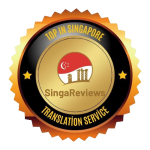
Certified Legal Translation Services in Singapore: Safeguarding International Contracts for Corporations
Singapore’s position as a leading financial and business hub in Southeast Asia has made it a prime destination for international commerce. However, with this global reach comes significant challenges for corporate entities navigating cross-border transactions. One of the most critical yet often underestimated risks is accurately translating legal documents and international contracts. Understanding the importance of certified legal translation services can mean the difference between successful business ventures and costly legal disputes.
Understanding Legal Translation Requirements in Singapore
Singapore’s legal framework mandates specific requirements for document translation, particularly for submissions to government agencies. The Immigration and Checkpoints Authority (ICA) requires that certified English translations accompany all non-English documents. Similarly, the Ministry of Manpower (MOM), the Accounting and Corporate Regulatory Authority (ACRA), and various courts accept only professionally certified translations.
These requirements extend beyond immigration documents. Corporate entities with international contracts must ensure their legal documents meet Singapore’s stringent standards. The translation must be complete, accurate, and certified by qualified professionals.
The High Stakes of International Contract Translation
Singapore’s legal translation services market was valued at USD 1.5 billion in 2024 and is forecasted to grow 8.5% annually, reaching USD 2.9 billion by 2033. This growth reflects the increasing complexity of international business transactions and the critical need for accurate legal translations.
Translation errors in international contracts can have devastating consequences. Research shows that 42% of legal professionals have encountered problems caused by inaccurate translations in legal documents. These mistakes often lead to delays in legal proceedings, financial losses, and sometimes even contract cancellations.
Consider a practical example: mistranslating the term “consideration” in a business contract can fundamentally alter the parties’ legal obligations. Such errors can result in disputes, breach-of-contract claims, and substantial financial penalties.
Common Risks Associated with Poor Legal Translation
One of the most significant risks associated with inadequate legal translation is the potential for misunderstandings of contractual terms and conditions, which can lead to both parties being unclear about their respective rights, duties, and obligations. Such misinterpretations may result in costly legal disputes, non-compliance issues, and damaged business relationships, all of which could have serious financial and reputational consequences.
1. Contractual Misinterpretation
One of the most significant risks involves misunderstanding contractual terms and conditions. Mistranslating key clauses causes both parties to misunderstand their rights, obligations, and expectations. For example, if someone translates “delivery” as only “shipping of goods”, but it actually means “transfer of ownership,” they can create major disputes. For instance, translating “delivery” as merely “shipping of goods” when it actually means “transfer of ownership” can lead to serious disputes.
2. Financial and Legal Consequences
Mistranslated financial terms, currency denominations, payment schedules, or liability clauses can result in substantial monetary losses. Companies may find themselves exposed to unintended legal liabilities, non-compliance with local regulations, or violations of intellectual property rights.
3. Operational Disruptions
Translation errors significantly delay business operations. When regulatory officials reject filings because of inaccurate translations, companies may need weeks or months to resolve the issues, which stalls business activities. These delays can result in missed opportunities, such as losing contracts to competitors or missing regulatory deadlines.
4. Reputational Damage
Poor-quality translations can harm a company’s reputation, especially if they lead to mistakes in business transactions or regulatory non-compliance. International partners, clients, and regulators may question a company’s professionalism and reliability when encountering translation errors.
The Importance of Certified Translation Services
Certified translation services provide officially recognised translations with authentication confirming their accuracy. These specialised translations are essential for official purposes, including legal proceedings, government submissions, and business registrations.
Professional certified translation services ensure several critical elements:
- Accuracy and Completeness: The translation must render the original document’s content accurately.
- Legal Expertise: Translators must possess knowledge of both languages and the legal systems involved in the translation.
- Proper Certification: Documents must include signed statements from qualified translators or translation companies attesting to accuracy.
For businesses requiring comprehensive legal translation support, understanding common types of business legal translations and their language requirements is essential for proper planning and compliance.
Key Areas Where Singapore Corporations Need Legal Translation
Business contracts serve as the essential framework underpinning international commerce, establishing clear terms and expectations between parties across borders. Ensuring the accuracy and clarity of these documents through skilled legal translation is crucial to facilitating effective cross-border transactions and preventing costly misunderstandings or disputes.
1. International Contracts and Agreements
Business contracts form the foundation of international commerce. These documents require precise translation to prevent misunderstandings leading to costly legal disputes. Professional translators accurately convey delivery schedules, payment conditions, and liability limits across languages.
2. Mergers and Acquisitions
Cross-border M&A transactions require experts to translate complex legal documentation with absolute precision. Due diligence reports, shareholder agreements, and financial statements require expert translation to facilitate smooth negotiations.
Companies involved in such transactions should explore expert legal translation for mergers and acquisitions to ensure proper documentation handling.
3. Regulatory Compliance Documents
Singapore’s regulatory environment requires the accurate translation of various compliance documents. Privacy policies, employment contracts, and financial reports must meet local regulatory standards while maintaining transparency with government authorities.
4. Employment and Immigration Documentation
Companies employing foreign workers or transferring employees internationally need correctly translated work permits, visas, and residence applications. Government authorities require these documents in English, making accurate translation mandatory for successful applications.
The Translation Process for Legal Documents
Qualified legal translators with comprehensive expertise in the relevant legal systems should perform the initial translation, as they are able to interpret complex legal terminology, accurately convey cultural nuances, and ensure that every aspect of the original document is reflected in accordance with the legal standards and requirements of the target jurisdiction.
Step 1: Professional Translation
Qualified legal translators with expertise in relevant legal systems perform the initial translation. These professionals understand legal terminology and cultural nuances necessary for accurate interpretation.
Step 2: Review and Quality Assurance
Second, translators and professional editors thoroughly review translated documents. This process ensures accuracy, maintains legal intent, and checks for grammatical correctness.
Step 3: Certification
Professional translation companies provide certificates of accuracy, attesting that the translation is complete and accurate. This certification is crucial for authorities to accept the document.
Step 4: Notarisation (When Required)
Singapore notary publics notarise translations for the Immigration and Checkpoints Authority (ICA) submissions and specific official purposes. This extra step gives the translated documents legal authentication.
Step 5: Authentication
Singapore authorities require some documents to receive authentication from the Singapore Academy of Law (SAL) before they accept them. This Singapore Academy of Law (SAL) authentication offers the highest level of document verification available.
Choosing the Right Legal Translation Service Provider
When selecting a legal translation service provider, it is essential to choose companies that employ certified translators with substantial legal expertise specific to the relevant jurisdictions. This ensures that the translators not only understand the complexities of legal terminology, but also possess a thorough knowledge of country-specific laws and compliance requirements, enabling them to deliver translations that meet the highest standards of accuracy and legal validity.
1. Professional Qualifications
Select translation providers with certified translators who possess legal expertise in relevant jurisdictions. Look for International Organisation for Standardisation (ISO) certifications (ISO 17100, ISO 27001) demonstrating commitment to quality standards.
2. Industry Experience
Choose providers with extensive experience in legal translation, particularly those familiar with Singapore’s regulatory requirements. Companies should verify the provider’s track record with similar legal documents and international contracts.
3. Technology Integration
Modern translation services combine human expertise with advanced technology. Leading providers use AI-driven tools for efficiency whilst maintaining human oversight for accuracy and cultural sensitivity.
4. Comprehensive Service Offerings
Providers that offer complete solutions, including translation, certification, notarisation, and authentication services, allow clients to process documents seamlessly without coordinating multiple service providers.
To understand the critical nature of professional translation services, businesses should review information about the importance of translation services for the legal industry.
Best Practices for Managing Translation Risks
It is important to incorporate translation requirements into project timelines as early as possible, ensuring there is sufficient time allocated for legal translation, notarisation, and authentication to avoid unnecessary delays and to meet all regulatory and compliance obligations throughout the course of the project.
1. Early Planning
Incorporate translation requirements into project timelines early. Legal translation often requires several weeks, especially when notarisation and authentication are needed.
2. Document Preparation
Organise original documents clearly and thoroughly before translation. Include all relevant stamps, seals, and annotations because translators must translate every element.
3. Regular Updates
Stay informed about changing regulatory requirements and translation standards. Singapore’s evolving legal landscape may introduce new compliance obligations.
4. Professional Consultation
Engage with legal translation experts early in international transaction planning. Understanding specific requirements can prevent costly delays and ensure compliance.
Businesses should also know the top five challenges of translating legal documents to better prepare for potential complications.
Avoiding Common Translation Pitfalls
Avoid using automated translation tools for legal documents. These systems lack the understanding of legal context and cultural nuances necessary for accurate legal translation
1. Machine Translation Risks
Avoid using automated translation tools for legal documents. These systems lack the understanding of legal context and cultural nuances necessary for accurate legal translation. Review information about Google Translate dangers for legal documents to understand these risks better.
2. Incomplete Documentation
Ensure all document elements are translated, including footnotes, annexes, and appendices. Authorities typically reject partial translations.
3. Cultural Considerations
Legal concepts may not translate directly between different legal systems. Professional translators understand these differences and can provide appropriate adaptations.
4. Time Constraints
Allow sufficient time for proper translation, review, and certification processes. Rushed translations often contain errors that can prove costly.
Businesses should familiarise themselves with the seven need-to-knows about legal translation for a comprehensive understanding.
Technology’s Role in Modern Legal Translation
The translation services market is experiencing significant technological advancement. Singapore’s language translation NLP market is projected to reach US$44.71 million in 2025 and grow at 22.97% annually to reach US$154.60 million by 2031.
AI-driven translation tools can reduce turnaround times by up to 50% whilst maintaining accuracy. Blockchain-based verification systems provide immutable proof of document authenticity, which is crucial for legal proceedings and compliance audits.
However, technology should complement, not replace, human expertise in legal translation. Combining AI efficiency with human understanding of legal nuances provides optimal results for complex legal documents.
Companies interested in leveraging technology should explore how to transform legal business with these technologies.
The Financial Impact of Quality Translation
Investing in professional legal translation services represents risk mitigation rather than mere expense. The cost of resolving translation-related disputes can be substantial, including legal fees and potential damage to business relationships.
Professional certified translation services in Singapore typically range from SGD 30 to 70 per page, depending on language complexity. Compared to potential financial losses from translation errors, this represents a minimal investment for significant risk reduction.
Companies should also consider the benefits of certified translation when evaluating service options.
Future Trends in Legal Translation
Singapore’s strategic position as a regional dispute resolution hub under the Singapore Convention creates increasing demand for legal translation services. Integrating legal technology innovations, including AI-driven translation and blockchain verification, transforms operational efficiency and security.
Market penetration strategies for legal translation providers focus on establishing partnerships with law firms, arbitration centres, and government agencies. This trend benefits corporate clients through improved service accessibility and quality.
The emphasis on multilingual support for Association of Southeast Asian Nations (ASEAN) languages and compliance with Singapore’s Personal Data Protection Act (PDPA) will continue driving service evolution.
Building a Comprehensive Translation Strategy
Businesses should thoroughly assess documents that require translation across all operations, such as contracts, compliance documents, employee materials, and regulatory filings.
1. Assessment of Translation Needs
Businesses should thoroughly assess documents that require translation across all operations, such as contracts, compliance documents, employee materials, and regulatory filings.
2. Vendor Selection and Management
Establish relationships with qualified translation service providers before urgent needs arise. Maintain approved vendor lists with verified capabilities and track records.
3. Quality Control Processes
Implement internal review processes for translated documents. Designate legal team members to verify translations align with business objectives and legal requirements.
4. Training and Awareness
Educate staff about translation requirements and the importance of professional services. Ensure team members understand when certified translations are necessary and how to obtain them.
For businesses requiring ongoing translation support, exploring business localisation and content document translation services can provide comprehensive solutions.
Regulatory Compliance Considerations
Singapore’s evolving regulatory landscape requires constant attention to compliance requirements. The Corporate Service Providers Act and Companies and Limited Liability Partnerships (Miscellaneous Amendments) Act represent significant changes in Singapore’s corporate compliance framework.
These developments emphasise transparency and compliance over convenience, making accurate translation of legal documents even more critical for international businesses. Companies must ensure their translation practices align with these enhanced regulatory requirements.
Professional legal translation services help businesses navigate these complex requirements whilst maintaining operational efficiency.
Conclusion
Legal certified translation services represent a critical component of risk management for Singapore corporations engaged in international business. The consequences of poor translation extend far beyond simple communication errors, potentially resulting in substantial financial losses, legal disputes, and reputational damage.
By understanding translation requirements, selecting qualified service providers, and implementing comprehensive translation strategies, businesses can significantly reduce their exposure to international contract risks. The investment in professional legal translation services provides essential protection for companies operating in Singapore’s dynamic global business environment.
The growing market for legal translation services reflects the increasing complexity of global commerce and the critical importance of accurate legal communication. Companies prioritising professional translation services position themselves for successful international expansion while minimising costly legal complications.
For businesses seeking comprehensive legal translation support that meets Singapore’s stringent requirements, partnering with experienced providers ensures compliance, accuracy, and peace of mind in international business transactions.
If you have any enquiries or require quotations regarding Certified Translation Services, contact our legal solutions department, which can provide you with a quote.










